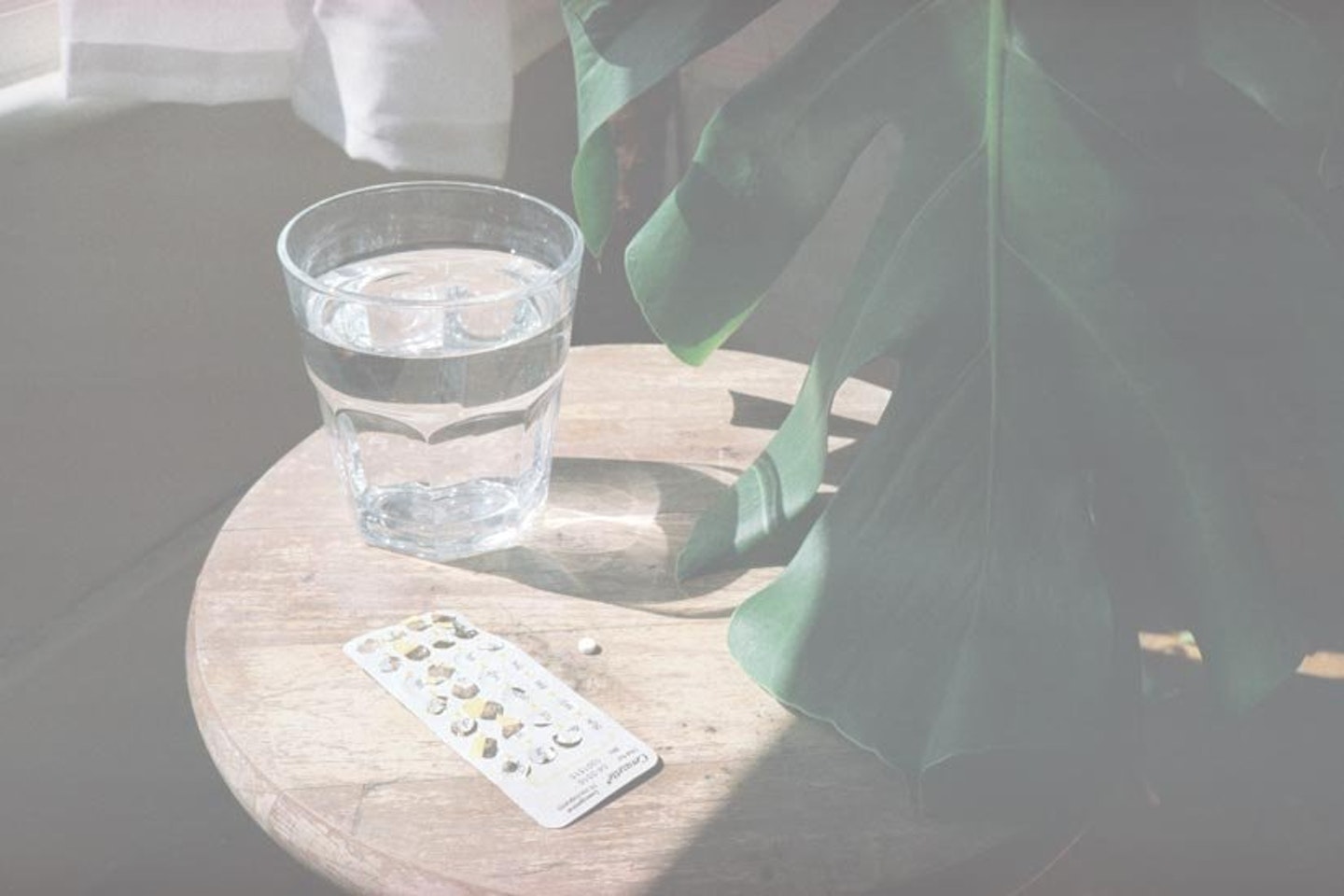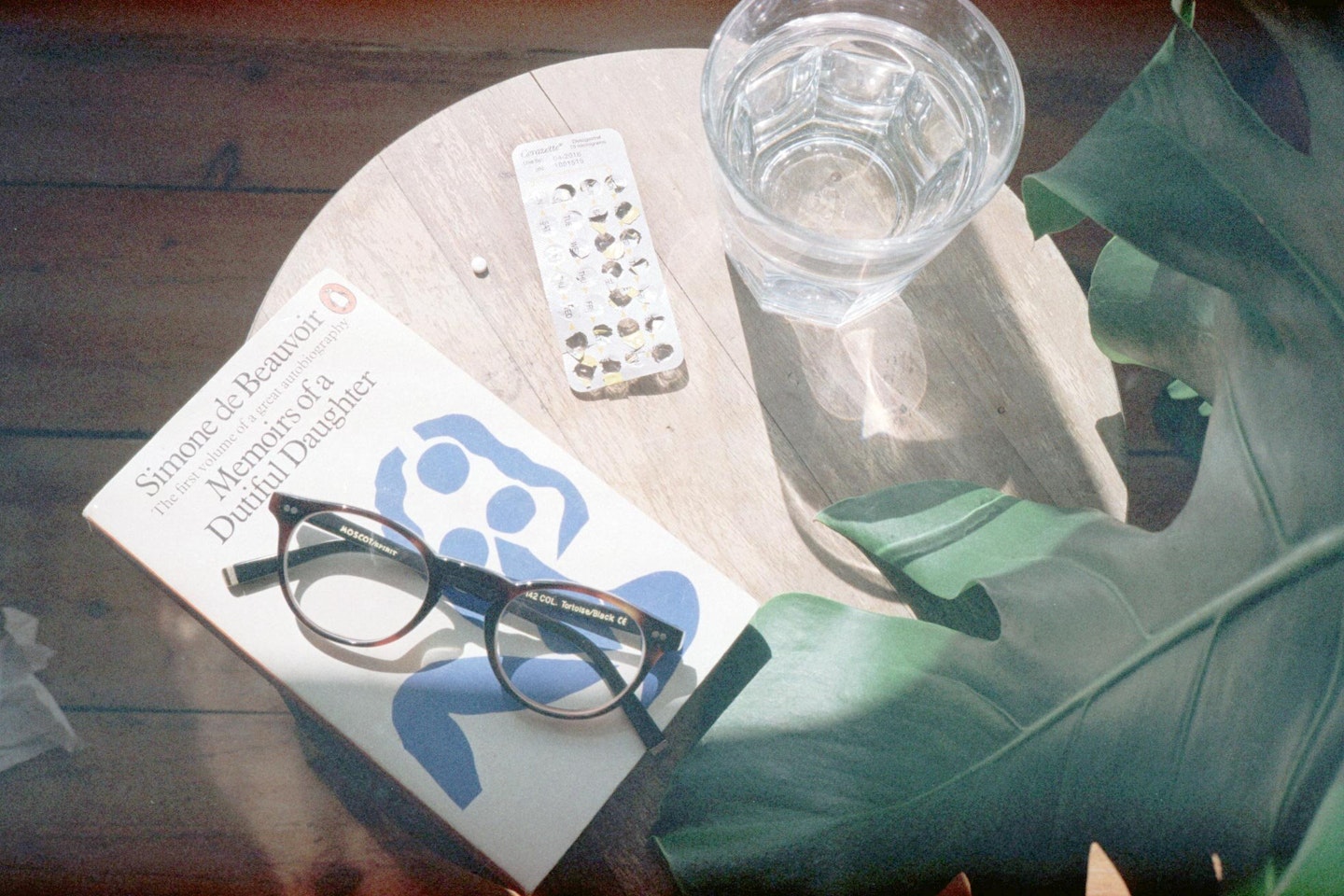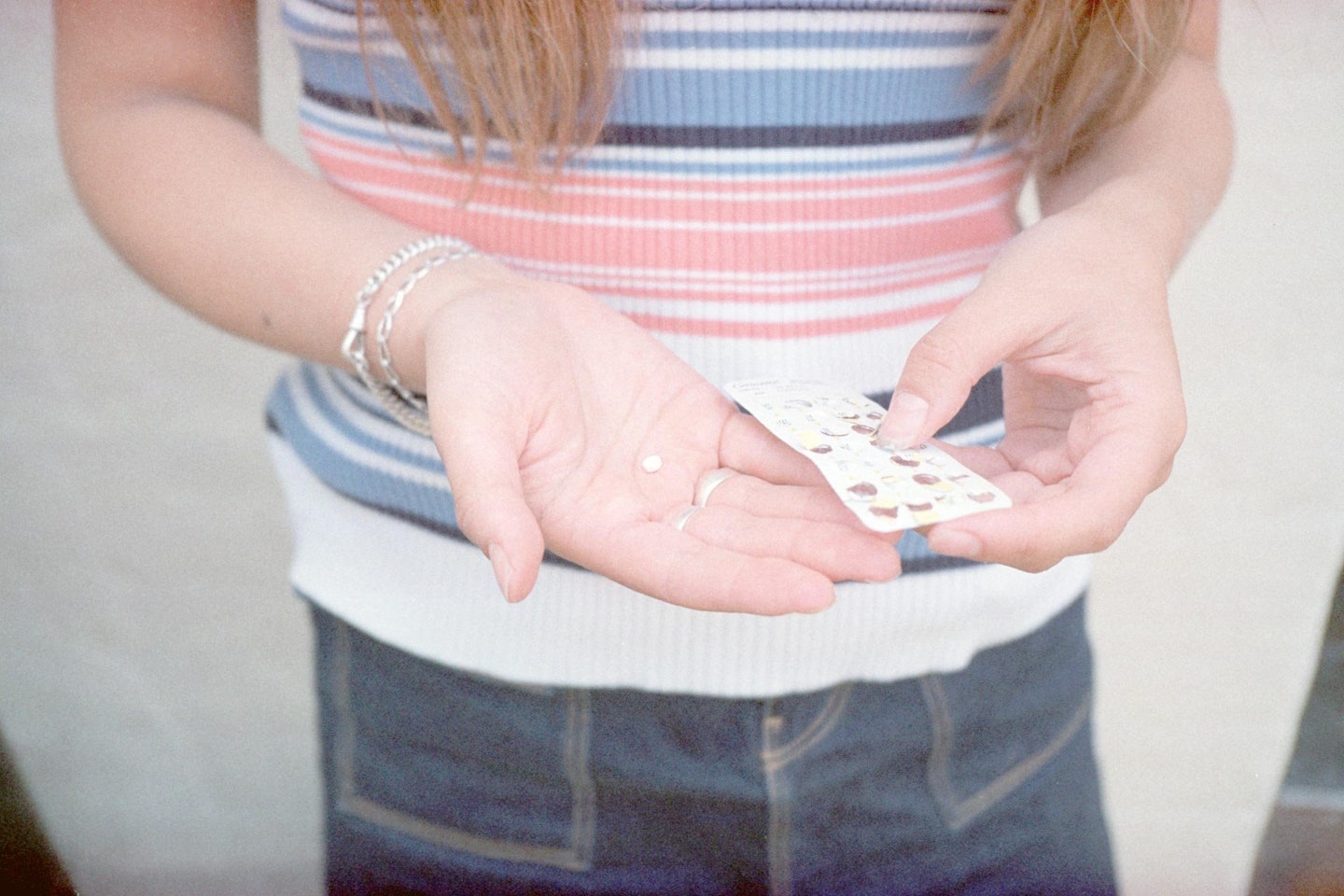Zoé started the pill when she was 16, and is now 26. She’s spent 40% of her life taking this medication. Emma, 33, took the pill for 8 years, and Rose 25, has spent five years taking different sorts of the contraceptive pill.
So far, so normal. After all, two thirds of women aged 20-24 and 55% of women aged 25-29 take the pill. Arriving in the late 1960s, the pill has been widely credited as the foundation stone for both the sexual revolution and the women’s liberation movement of the 1970s. Now, it such a huge part of modern life that, of all the pills in the world, the contraceptive pill gets to be the Pill, with a capital P. With an 99% effectiveness it’s the most common way British women have sex without getting pregnant. However, that’s not why these women take it. Zoe, Emma and Rose all deploy an 100% reliable, non-hormonal method of avoiding pregnancy. What is this magic and where do you get it from? It’s called being a lesbian.
As part of The Debrief’s Mad About The Pill investigation into links between young women’s mental health issues and uptake of the pill, it’s worth taking a look at lesbians. Their experiences of non-contraceptive pill-taking uncovers the ways the pill has become a panacea for all young women’s ails, but also show just how vital it is that work that must be done to improve women’s healthcare and education.
Zoé was prescribed the pill ‘for irregular periods and severe menstrual cramps. Taking the pill regulated my periods and made the cramps a little easier’, she tells The Debrief. However, other side effects she felt were: ‘depression, anxiety, feeling “crazy”, fatigue, brain fog, loss of concentration…it was hard to tell whether these were linked to pill or not.’
Four years into pill-taking, Zoé was diagnosed with major depressive disorder (MDD) and prescribed antidepressants. She also has a history of anorexia, which is, along with its entwined weight and mental health impacts, . Now, after reading up on links between depression and the pill, she’s stopped taking it: ‘I went on PubMed [a site of medical publications] and found lots of papers statistically linking pill to depression, and speaking to friends confirmed this with anecdotal data.’

As a scientist, Zoe was able to educate herself much more than her GPs had: ‘I felt horrified that GPs who were aware of my mental health issues just let me keep taking the pill without questioning it. I’m also kind of hopeful that things might get better after coming off the pill.
‘I think doctors need to be as transparent as possible with patients and I also respect them a lot more when they admit they don’t know something and seek clarification.’
Harriet suffers from PMT, big time: for two and a half weeks ahead of her period she feels severe symptoms of anxiety and depression and when her period comes it is significantly heavy. She told the doctor about her problems, but explained ‘I don't sleep with men so I didn't particularly want the pill’. The doctor prescribed her Microgynon and sent her on her way. ‘As I was leaving’ Harriet recalls, ‘the doctor offered me a bag of free condoms to take with me. I told her again: “I don't sleep with men”, but she kept insisting “just in case”. I felt obliged to take them just to get out of there.’
From the sound of it, the doctor refused to believe this young woman’s attestations she sleeps with other women, not men, and therefore, it’s logical to believe that Harriet was prescribed the pill on the misunderstanding that it would stop her getting pregnant. Microgynon didn’t work for Harriet’s symptoms, and it started giving her migraines so bad she would lose her vision (migraines with aura). After six months, she went to a second doctor who took her blood pressure and warned that Microgynon ‘could increase [her] chances of having a stroke’ and that she should have ‘never been prescribed it'. This doctor also prescribed the contraceptive pill Cerelle, advising it would halt Harriet's periods and her bad PMS. But in reality, she says: ‘my anxiety and depression were even worse, I couldn't get out of bed for weeks, barely left the house, kept crying and I was bleeding almost every other day.’
Harriet stopped taking Cerelle after three months. As for the symptoms she initially went to the doctor for? ‘I have just had to learn to suffer with it each month.’ No medical professional has offered Harriet a blood test of her hormones to see whether she lives with an imbalance and, she says: ‘I mainly felt like they just didn't listen to what my actual problem was. They knew I wanted to stabilise my periods but didn't fully take notice of why or what was happening to me during menstruation and how it was affecting my day-to-day life.’

Harriet has lost faith in doctors: ‘It felt like they wanted to send me away with a quick fix. I hated putting hormones in my body every day, and I made that very clear but no one listened.’
There is a tiny glimmer of silver lining, though: ‘It makes me glad I'm a lesbian, and don't have to go through this just to not get pregnant!’
Due to the way society treats LGBT people, lesbians are two times more likely than their straight peers to suffer mental illness. Yet they are still being prescribed a medication that is both superfluous to need and carries potential but curiously under-explored mental health risks. Maybe some straight women are willing to sacrifice a bit of happiness for the pill out of fear an unwanted pregnancy could make them a whole bunch sadder. But take this risk out of the equation and it’s obvious that any suspected ‘hormone imbalance’ should be evaluated properly before any woman - especially one not having sex with men - is prescribed any synthetic hormones.
Emma, 33, had her hormones levels tested way back when she was 18. She’d started her ‘ridiculously irregular’ periods relatively late, experiencing them ‘anything between every 30 and every 80 days, until one day I just stopped having any.’ On her mum’s request, Emma went to the doctor. Hormone tests said she had a high level of prolactin, which is produced by the pituitary gland. An MRI scan was ordered in case of a problem with this gland. But the tests showed no problem and the hospital consultant told Emma she either had polycystic ovaries (PCOS) or this was just her natural hormone balance and that neither were worth worrying about. Emma was prescribed Microgynon 30 which made her periods regular ‘and virtually pain free’, although, she says: ‘I did begin getting migraines occasionally.’
Aged 26, Emma stopped taking the pill. Not using it for contraception, ‘I wanted to give my body a chance to self regulate without it.’ She now gets periods every 30-50 days, and doesn’t see this as a problem anymore. NHS Choices advises that: ‘the average is to have periods every 28 days. Regular cycles that are longer or shorter than this, from 24 to 35 days, are normal.’ However, the same site lists the causes of absent periods - sudden weight loss, over-exercising, obesity, stress, menopause, pregnancy (duh) PCOS and the pill. If these are the sole causes of a delayed period, then a delayed period is merely a symptom of much more visible and potentially life-threatening problem. Or, perhaps, a sign the patient is on, yep, you guess it, the pill. (If there's more to it than that, maybe the NHS's website could be a little more informative)
The exception is PCOS, which can lead to poor fertility and other health problems. Many studies have linked the condition - caused by a heightened level of androgens (male hormones) in the female body - to lesbianism. According to one study, lesbians are twice as likely to have PCOS than their straight female peers. It affects 2-20% of young women, yet there is no cure.

Rose suffered from two major symptoms of PCOS - acne and hirsutism (excess body hair). An ultrasound showed she did indeed have PCOS. Doctors prescribed her Dianette (a high oestrogen pill) for these symptoms: ‘but in retrospect’ she says, ‘it didn't do much except control my periods’. Her mental health issues, low mood and low confidence, remained. The same goes for Yasmin (another high oestrogen pill)
Rose came of the pill and she says this caused vomiting and terrible period pains for a while. She still believes that she has PCOS, despite another doctor disregarding the results of the previous ultrasound. She also suspects she lives with a hormone imbalance that may affect her mental health but ‘would never go back on’ the pill, due to ‘fears of permanent damage and worse side effects’ than she’s already experienced.
There is no data to show how many lesbians are prescribed the pill. While much research is done into gay men’s sexual health due to the catastrophic pervasiveness of HIV in this community, the lack of frequency of woman-to-woman transmission of STIs means there are few supposed health risks attached to being a lesbian. But, PCOS and its link to lesbianism is an issue that needs sensitive exploration. Mental health issues are a problem. Migraines are a problem. Exacerbated symptoms of anxiety, PMS, depression and bleeding, caused by medication designed to help straight women, yet prescribed to lesbians are all problems. With research from Stonewall showing that 60% of medical health professionals believe being LGBT is irrelevant to healthcare, is it any wonder lesbians’ specific need - or, in this case, lack of need for the pill’s main effect - has been brushed under the carpet?
The Medicines and Healthcare products Regulatory Agency (MHRA), who deal with regulation of all medicines in the UK, tells The Debrief: ‘The risks associated with contraceptive pills would be expected to be similar for both the contraceptive and non-contraceptive uses. Benefits of any combined hormonal contraceptive far outweigh the risk of serious side effects for most women.’
Anecdotally, we all know someone recommended the pillon the basis of its non-contraceptive cosmetic benefits: it will remove our facial hair, make our skin look fresher and give us bigger boobs. We can also be told the pill will improve our moods. But is it any wonder we're feeling low when healthcare professionals, will collude with cosmetics companies to push boring old feminine conformity onto us? Lesbians are regularly critiqued, derided, harassed and even sexually assaulted as punishment for not doing womanliness in the right way, for being butch or tomboyish. To have a healthcare professional point out your 'hirsutism' where you previously saw a proud moustache is just another way of telling a woman she's not the right sort of woman. And back to MHRA's comments on risks versus benefits: how can any benefits of taking the hormonal contraceptives outweigh the risks when the massive benefit of not getting pregnant is null and void to the patient? It's like giving someone a burger without the bun and saying it's still McDonald's.
The MHRA added that: ‘Medicines safety is of paramount importance and under constant review. Any new significant information on the efficacy or safety of medicines is carefully reviewed and action is taken if required.’
The Faculty of Sexual and Reproductive Healthcare of the Royal College of Obstetricians & Gynaecologists’ Clinical Effectiveness Unit Guidance on the combined hormonal contraceptive does detail benefits of and side effects of taking the pill for non-contraceptive uses. Any potential link between the pill and various cancers, stroke and deep vein thrombosis has been checked and double checked, because these are undoubtedly life-threatening issues. But though acne, hirsutism and heavy menstrual bleeding may be dulled by the pill, the evidence to prove this isn’t as rigorous as you might have been led to believe. The report explains that because studies on the pill and mood changes are: ‘largely depend on women’s own perceptions, it is difficult to prove a causal relationship between CHC [the pill] and mood changes’. Basically, women need to speak up a lot more about less visibly life-threatening issues if we want stuff to change. But medical health professionals also need to listen to the women they're treating.
The Royal College of General Practitioners were unable to provide a quote due to time limitations caused by, in their words: ‘the NHS crisis’.
Not all accounts of lesbians on the pill are negative: Flo, 26, says: ‘Gederal has been a life saver for my skin. After finishing uni, I got acne and terrible skin. I was told I could either go on the pill, get a chemical peel or try antibiotics. The pill cleared my skin up, and I've never noticed a difference in myself emotionally.’
She adds, though: ‘But if I could stop I would. I've read it's not good to take it over long periods and I've been on and off of it for roughly 7 years.’

It’s not only lesbians who take doses of progesterone or oestrogen for non-contraceptive reasons: trans women take them to grow breasts and fat stores on their thighs and bum and menopausal women take them to help steady one of the most intense and life-changing experiences women go through next to pregnancy and childbirth. The effects are certainly dosage dependent, but it’s undeniable that progesterone and oestrogen are strong enough to revolutionise bodies.
The pill has and will continue to transform women’s lives. Its primary use and efficacy - to halt the belly-tumbling anxiety, or reality, of unwanted pregnancy - is fantastic. If I took a pill for every friend of mine who’s been spared unwanted pregnancies thanks to the invention of the pill, I’d be on the pill for six months. But the relationship between mental health issues and the contraceptive pill exists and this, along with the ease at which medical professionals prescribe it to women who have no need for its main purpose, and little knowledge of its machinations, needs more research and serious investigation.
We talk of testosterone’s power, of its ability to fuel nations, drive armies and power tantrummy blokes who, perhaps, are acting more out of a culturally-learned entitlement than natural desire to destroy. But what of oestrogen’s power? What of progesterone’s power? Pill brands may be given the same sort of whimsy decorative names that could make up a Euro-pop girlband circa 1996: Lizelle, Cilest, Yasmin, Cerazelle and Mercilon - but how’s about we start taking these hormones a bit more seriously? We all know how people perish rather than take female hurricane names seriously. Contraceptive pills aren't quite hurricanes, but we are in the midst of a mental health crisis: a quarter of women aged 16-24 are suffering with depression or anxiety (remember, that figure jumps up with LBT women). To throw powerful synthetic hormones at this isn't right. These are not lifestyle drugs. They are complex medicines.
It's time we start treating women and their issues as individuals, while still keeping tabs on the healthcare needs of specific groups of women, instead of making out the pill is the cure-all bath-salts for all young women’s ails.
**You might also be interested in: **
What Do Experts Think About The Contraceptive Pill And Mental Health?
Is Spending My Entire 20s On The Pill Going To Mess Up My Body?
Follow Sophie on Twitter @sophwilkinson
Names have been changed
This article originally appeared on The Debrief.
